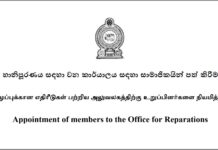The Sri Lanka Institute of Directors (SLID) together with the Sri Lanka Association of Software and Services Companies (SLASSCOM) organized a webinar, moderated by Dilshan Rodrigo-Chief Operating Officer of Hatton National Bank Plc., to discuss, explore and share insights on “Leveraging Technology to Transform Business in the Post-Covid Era”. The keynote address was delivered by Uber’s Global Head of Support Operations and Co-Chair for Women of Uber – Lisa Stoner. The panel comprised of two eminent technology and business leaders Madu Ratnayake-Executive Vice President, Global CIO and General Manager of Virtusa Sri Lanka Operations/Independent Director of HNB and Director of ICTA, and Asanka Ratnayake-Group Director of Hayleys Advantis Limited.
“Covid brought unprecedented times to Uber and to everyone else. From connecting 16 million trips per day in March 2020, we went on to very publicly urging our riders to stay at home. During this time Uber fundamentally redefined its mission for the year and went from ‘setting the world in motion’ to ‘moving only what matters’. We closed all our offices and moved tens of thousands of workers home although Uber did not have a work from home environment. During this time, under the leadership of the CEO and of the Board one of the key principles we followed was that we would do the right thing and empowered business leaders in every market to make decisions around doing the right thing. Every positive matter we were able to do was absolutely enabled by our people and technical innovation” said Lisa Stoner adding that during the Covid period, Uber’s business changed from being a rides business to a delivery business and also saw a complete change in their top markets.
“We started a campaign to get local restaurants on the Uber platform which meant we had to onboard them as quickly as possible. To achieve this, we made some internal technology changes and most importantly we leveraged a lot of small startup technology tools available for menu creation etc. As a young company we had a lot of pockets and places to incorporate technical innovation including machine learning” she said.
She highlighted that technology automation, diversity and inclusion, relentless elevation of standards, and changing the definition of success as the things that helped Uber to come out of Covid stronger than before. On the automation front, Uber used machine learning and predictions to predict most likely issues helping customers to reach out to Uber more easily while fully automating the customer self-help process devoid of agent involvement resulting in a high level of efficiency and positive customer experience. She also said that customer experience will be a priority for Uber in 2021. Lisa noted that it is important to recognize the pace of change of business and to accordingly adopt technology which will also help to push the bar higher, challenging one to think about what diversity means to the team and whether one does actually have a diverse team which values ideas over hierarchy.
“Data should be your best friend to help guide the decision-making process and not HIPPO (Highest Paid Person’s Opinion). Ideas of a hierarchy combined with technology are probably the two most powerful tools that you can have to advance your business” she further added.
Sharing his thoughts on Virtusa’s experience, Madu Ratnayake said “our first reaction when the pandemic hit was how to continue to ensure that our people are safe and have a proper environment to work, and how to work with our clients without interrupting their work. Being a tech services company, we had been working on a trend of remote co-worker environment for several years. Due to our global work requirement, we were able to fully transition to a work from home environment within 5-6 days when the pandemic hit, and it did not take us by surprise”.
“We experienced an acceleration in the digital transformation initiatives that we had undertaken for some of our customers” he added indicating that the world was fast turning to digital means in conducting their business in the Covid and post-Covid era.
Speaking of his experience at the HNB, Madu said that they had experienced an unprecedented acceleration in the take up of the Bank’s digital banking initiative which was launched just prior to the pandemic indicating an acceleration of a big digital shift that was already happening in the country.
Responding to a question on whether the pandemic has increased the digital divide, Madu responded in the affirmative citing the education sector where students in the cities and urban areas were somewhat less affected than their counterparts in rural areas due to the unavailability of suitable devices and connectivity to access online education related content in rural areas. The same would apply in other sectors such as entertainment where high bandwidth, luxury services such as streaming being unavailable in rural areas. However, he mentioned that under the auspices of the ICTA these issues were being addressed and a solution would be provided very soon to provide ubiquitous access and digital equality across the whole country. He also said that it is important to move fast in terms of digital and IT initiatives and recommended that IT budgets be not reduced.
Asanka, sharing his thoughts said that as a logistics company which is heavily involved in the supply chain, they faced a situation of being unable to forecast demand and order planning due to the sudden changes and dips etc that came about due to the Covid situation and that traditional planning tools did not suffice. Since logistics is an essential service, with the full support and commitment of the staff who had been assured that their jobs and pay would not be affected due to the pandemic, they were able to quickly adapt by resorting to basic technologies such as SMS (Short Messaging Service) and Whatsapp groups etc to plan, coordinate and collaborate. He also mentioned that planning cycles became shorter with weekly planning cycles becoming daily and daily cycles becoming hourly etc.
In conclusion, moderator Dilshan suggested that it is imperative that companies plan for scenarios rather than for items in order to minimize the impact of Covid and similar phenomena for business continuity and success.












